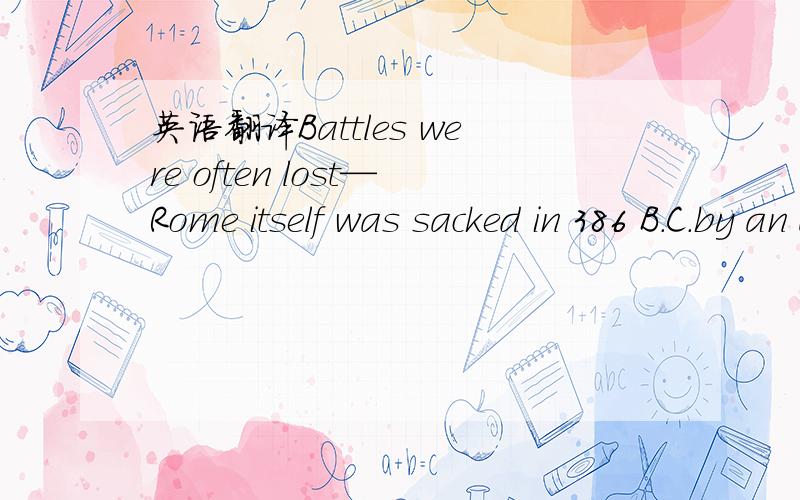英语翻译Battles were often lost—Rome itself was sacked in 386 B.C.by an army of Gauls from the north—but the Romans brushed off their defeats and pressed on.
来源:学生作业帮助网 编辑:作业帮 时间:2024/11/26 22:44:55

英语翻译Battles were often lost—Rome itself was sacked in 386 B.C.by an army of Gauls from the north—but the Romans brushed off their defeats and pressed on.
英语翻译
Battles were often lost—Rome itself was sacked in 386 B.C.by an army of Gauls from the north—but the Romans brushed off their defeats and pressed on.
英语翻译Battles were often lost—Rome itself was sacked in 386 B.C.by an army of Gauls from the north—but the Romans brushed off their defeats and pressed on.
虽然战场上经常失意——古罗马在公元前386年被来自北方的高卢军队(古法国)洗劫了(攻城、劫掠) ——但是罗马人对他们的失败不以为然并奋力向前.
战争常常会失败——罗马自己也曾在公元前386年被一支来自北方的高卢(古时候的法国)军队洗劫,——但是罗马人洗刷了失败,奋力前进。
全手工,超级准确,给分吧。
世界上没有常胜将军,即使是古罗马的军队,也在公元前386年被北方的高卢军队杀的落花流水,但是罗马人很快就让对方品尝了复仇的苦涩
战斗是经常丢失,罗马本身就是在公元前386解职由来自北方的高卢人,罗马人不以为然,但他们的失败和军队加紧进行。
我感觉 海加尔 回答最好啦
胜败乃兵家常事--罗马自己也曾在公元前386年被北方的高卢军队洗劫一番,但罗马人在后来洗刷了他们的失败并向世界步步进逼。
我认为这句话的语气是正面,首句的理解重点不应在”吃败仗”上。